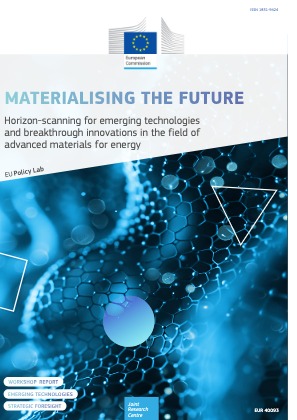This report documents the process and findings of a horizon scanning exercise, part of a series under the FUTURINNOV (FUTURe-oriented detection and assessment of emerging technologies and breakthrough INNOVation) project, a collaboration between the European Innovation Council (EIC) and the Joint Research Centre (JRC), aiming to bolster the EIC's strategic intelligence through foresight and anticipatory methodologies.
The workshop, held on 13 May 2024, had as its primary goal the evaluation and prioritisation of trends and signals on emerging technologies and breakthrough innovation, across all technolo-gy readiness levels (TRLs), within the EIC's Advanced Materials portfolio and with a particular fo-cus on their use in the Energy sector.
Signals for the workshop were gathered from experts, literature review, and text/data mining of patents, publications, and EU-funded projects. These signals were then scrutinised for their sig-nificance to the field's future by a diverse group of sector experts which led to the identification of nine key topics: accelerated material design/synthesis; biomaterials as part of the circular economy; advanced materials allowing new applications; closed loop battery recycling; innova-tions in catalysis; organic batteries for sustainable energy storage; design to performance bat-teries; design to cost batteries; and electrochemical water treatment. Furthermore, the workshop identified additional wild cards with high novelty and disruptive potential such as: circularity of materials (safe and sustainable by design); membranes / separators; process optimisation; 3D printing of electrode materials for energy and environmental engineering applications; and use of AI for the study of materials.
Participants also highlighted various factors that could influence the development, adoption, and promotion of these emerging technologies, which can be grouped under the following categories: governance and compliance frameworks; funding; collaboration and knowledge exchange; sustainable and efficient development; infrastructure and technological advancement and limita-tions; industry and market dynamics and constraints; innovation and risk management; supply chain and raw materials; and talent development.

